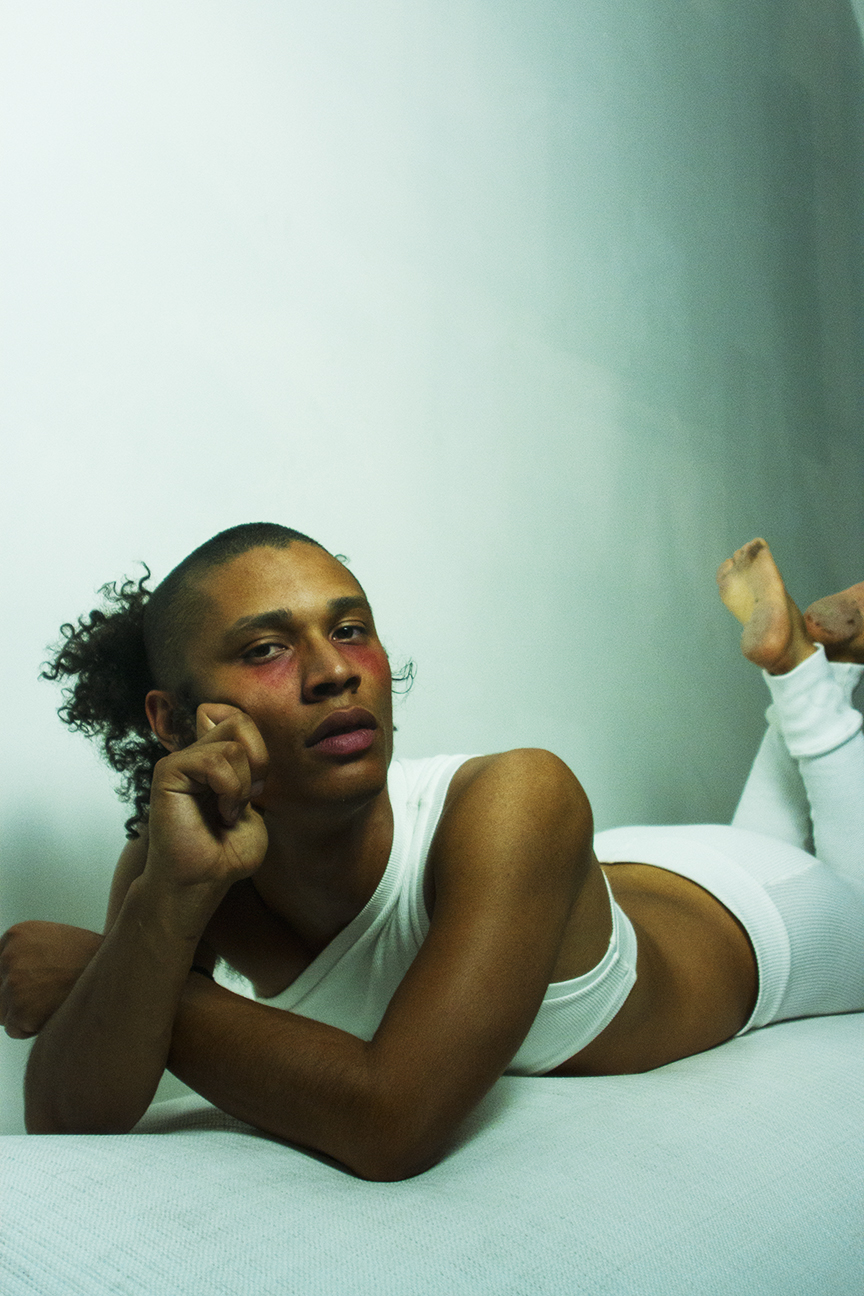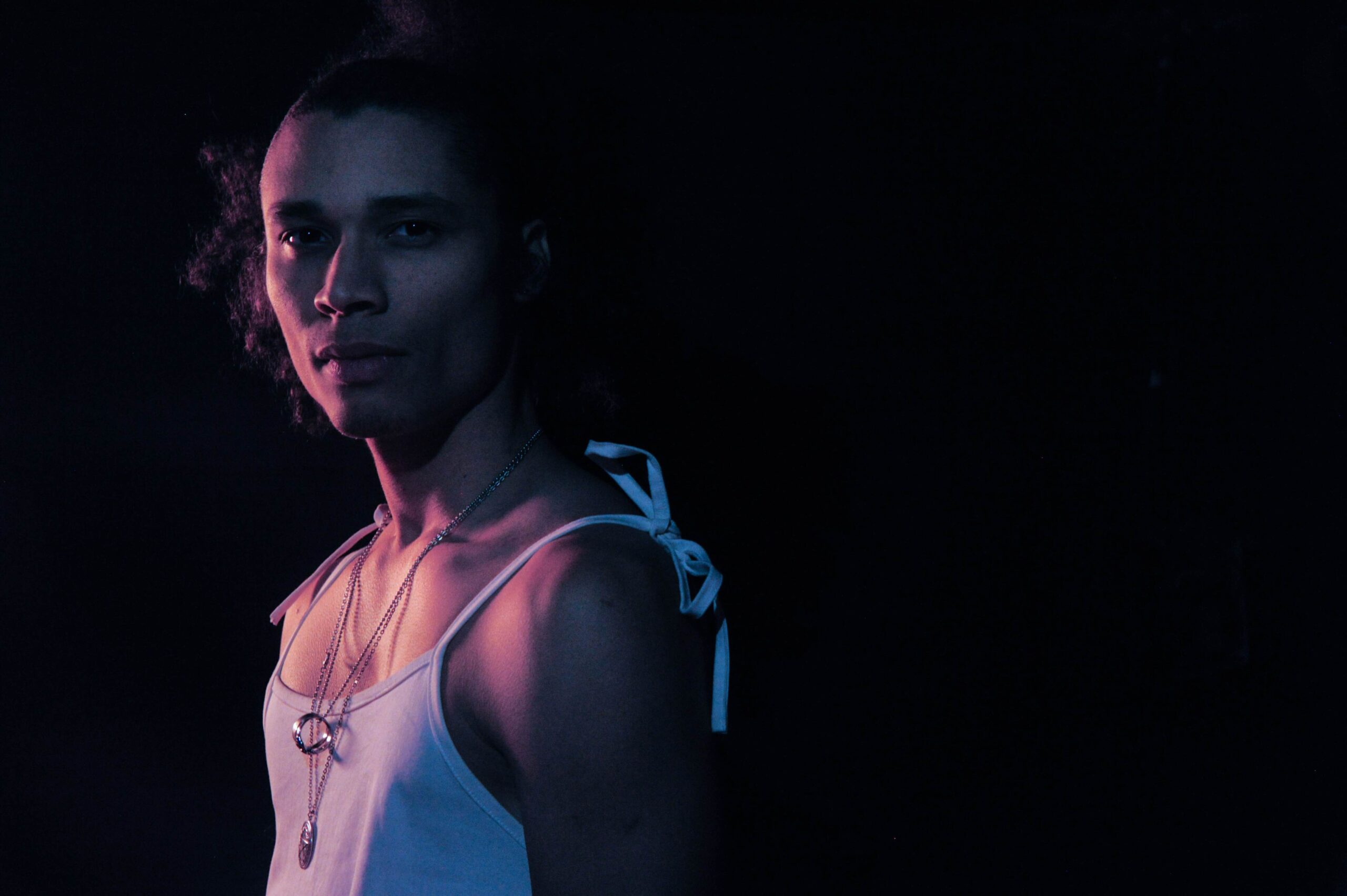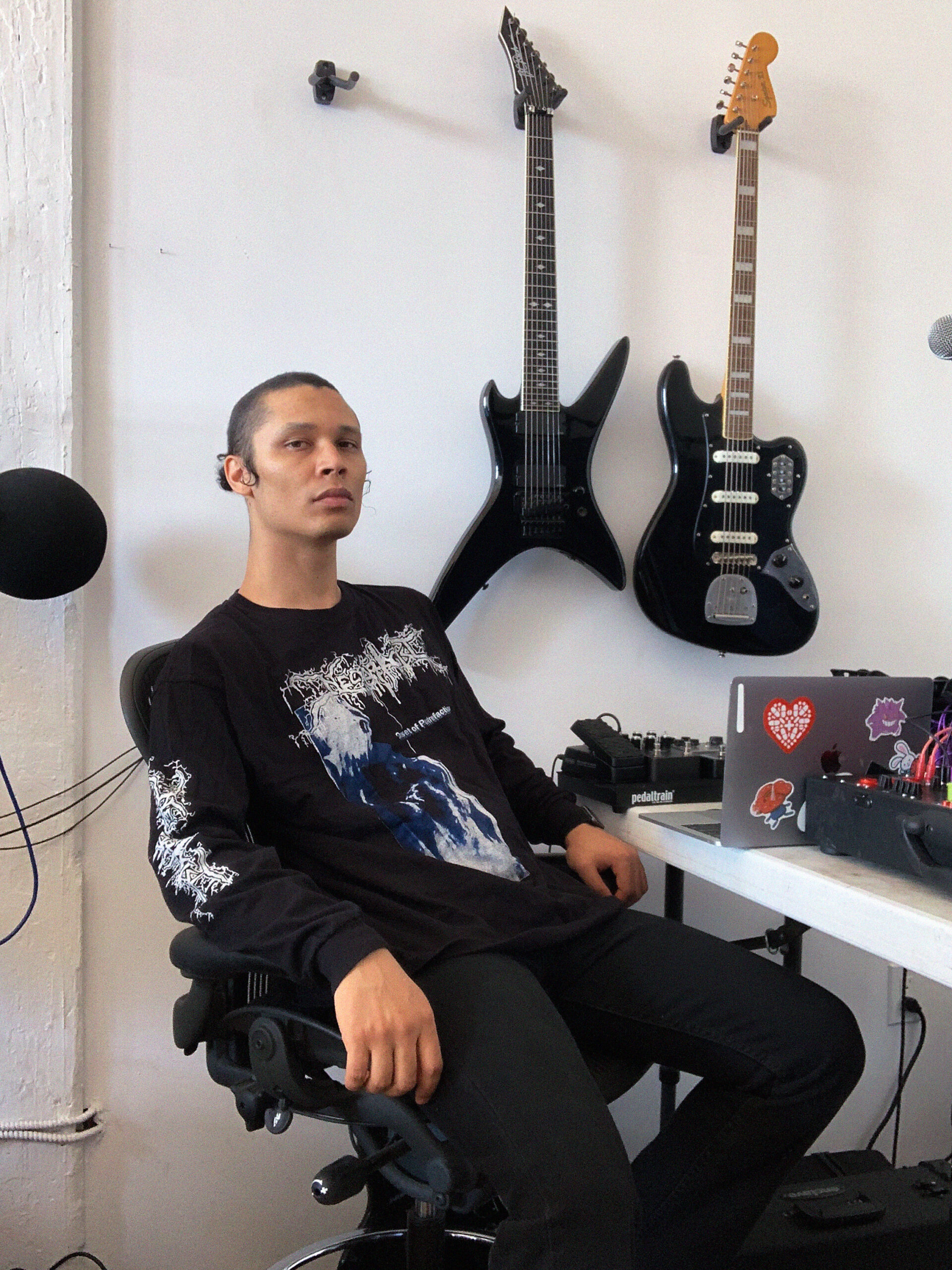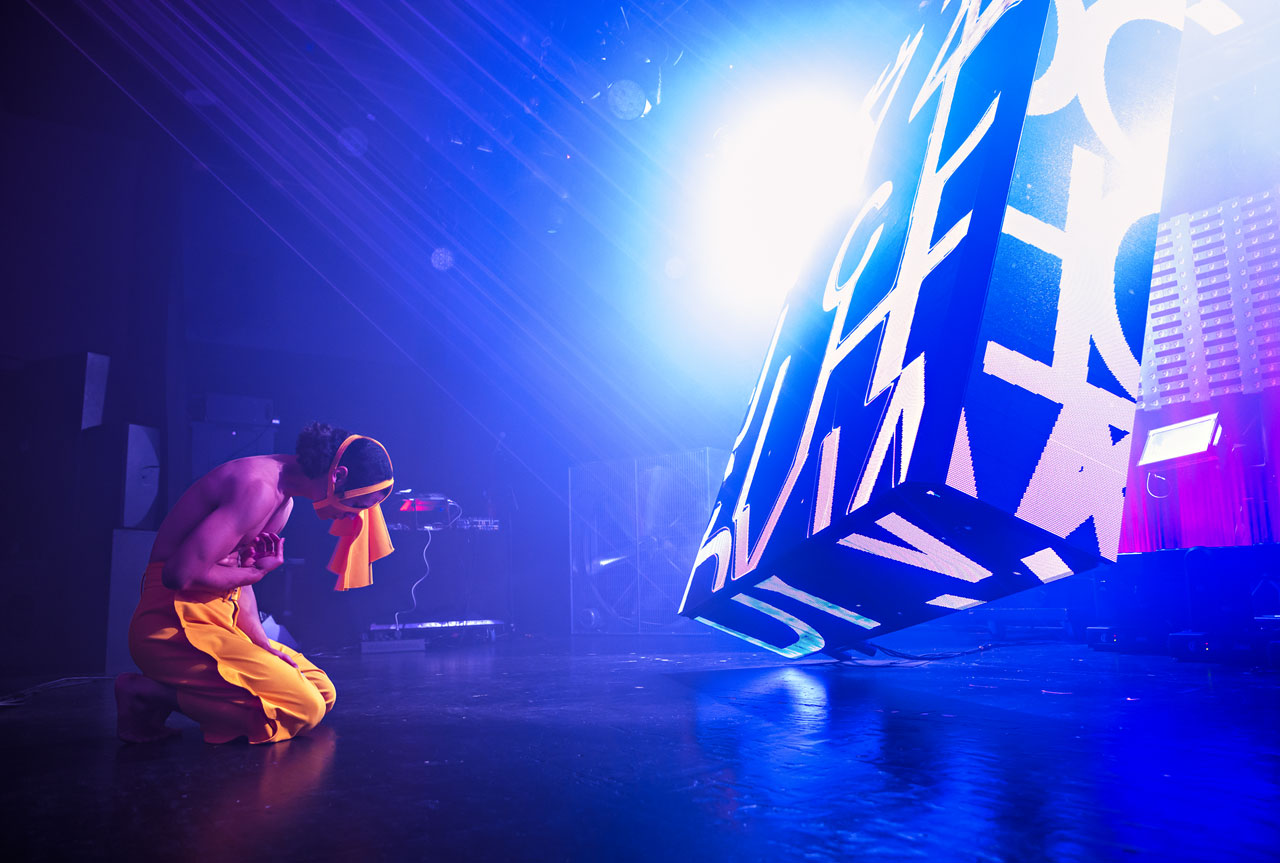INTERVIEW & MIX
April 26, 2023

Alleviate Eliminate Reify
William Ballantyne (CITY) interviews
Olin Caprison (VIOLENCE) + Exclusive mix
Olin Caprison (VIOLENCE) + Exclusive mix
INTERVIEW & MIX
April 26, 2023

Alleviate Eliminate Reify
OC: This is something I think about quite a bit. I’ve always been obsessed with truth. Over the years I’ve seen many artists actively constructing narratives about themselves. I understand the purpose of it from a business side, using a familiar narrative or creating a character, like a wrestling persona or something, in order to create a connection with people. But I always felt like it would be disingenuous. And would take too much effort.
WB: Yeah, I guess there’s a line to walk with that, where it is good for the career. But maybe it’s bad for the spirit and the soul, you know?
OC: Yeah. I just avoid it. With the business side of things, managers, they want stuff like that. But you know, like, when keeping it real goes wrong. [Laughs]
WB: Totally. Yeah, I was looking at your Instagram recently. And you posted something along the lines of, “since I stopped putting my sexuality and race in grant applications I’ve stopped getting them”.
OC: Yeah.
WB: Does this tie in with that kind of self-narrative and self-mythology that people are always constructing?
OC: Yeah. It’s a tedious game. It’s really annoying. There’s this idea of what an artist is supposed to be and what they’re supposed to do. Pretty much everyone crafts these narratives around themselves. “Oh, I don’t participate in that. I’m just being real.” But a lot of people that do that shit are obsessed with how they look.
They’re building up this rockstar persona. Like, I don’t give a fuck.
The thing with the applications, it was just seeing how much I could get away with. How little I could participate in the game. If I could sit back even a little bit more than I already have. The motherfuckers did not like it. [Laughs]
WB: Speaking of residencies and grants, you did NTS Work in Progress, and got the MacDowell fellowship.
OC: Yeah.
WB: What did those two programs give you, and what did you take away from them?
OC: MacDowell was amazing. I love that place. I feel like there weren’t that many musicians when I was there. I mostly hung out with journalists. I got pretty lucky. So I was there with these people talking about American mythologies, specifically. And Mexico-American relations, the myth of the wild west and how that affected American identity. These themes were central to my art for some years. So that was really awesome.
NTS was really cool, too. But I got that right at the beginning of the pandemic, right before COVID. So everything was looking really cool. They had all this stuff set up, like some studio in the middle of nowhere outside of London. And I was going to be able to go there and hang out with a bunch of engineers and stuff, right? Yeah. And then COVID hit so they were like, “Alright, we’ll give you some gear and some money.” They did what they could, tho, and I really appreciate that.
WB: In another interview you did recently you said that you’re obsessed with mythopoesis and repetition. Some of your music is repetitive in an almost obsessive way. I was wondering if there’s intentional musical techniques you use to invoke a grander idea of mythopoeia and repetition.
OC: Yeah, that comes into it in multiple ways. There’s this obsession with identity and genre, but I’ve always felt like most kinds of music share origins. The actual form of them, that’s the actual repetition.
WB: When you interpret real stories and personal experiences and put them into music, do you feel a responsibility of authorship? Is there a divide between your personal self and VIOLENCE? Is VIOLENCE a character or an entity or just you?
OC: Yeah, I do feel a responsibility. To expand my definition of what it means to be human. So, like, when I was a kid, I remember being treated not very well. People couldn’t figure out what race I was. So they would make fun of me, but they’d call me all kinds of things, because they couldn’t figure out what race I actually was [laugh].
And I just remember it would always make me wonder, “why do they consider this one thing less than human, or this other thing better?” So I became sort of obsessed with that confusion; I think I internalized it just from being in that environment. Kind of as a way of getting closer to a subjective reality instead of relying on biases.

WB: There’s a definite theme I perceive in your music of categories, boundaries, shapes. Essential truths that can change and flow, almost in an inspiring self-help way. This is something that I first noticed with a lot of your artwork, which is like, glamorous press pictures but grotesque-ified. The self-titled has the blackened teeth, or the NON record, with all the fingers.
OC: Yeah, absolutely. There’s a lot more potential for interesting new ways of thinking when you’re outside the boundaries of what is categorized, what is accepted.
It’s funny you bring that up because, with the album covers, it comes from me just really not liking to look at myself. I never really have. So I’m trying to kind of displace myself; make fun of the idea of like a “model” artist. I’ve done some modeling in the past, and I’ve always felt like it was very strange. It’s just such a different way of interacting with the world. I wanted to understand it, and it felt like a good test, but also just very silly. So at the end of the day it’s kind of funny to me to put my face on things, when I really don’t want it to be there.
WB: Modeling is often grotesque in and of itself.
OC: Yeah, exactly. I started off doing art. And I was working with nude models since I was like, fourteen. So I’ve always been looking – really looking – at what people look like for a long time. So it’s always really weird to see or hear about things like ideal bodies versus anything else that actually has to do with reality [laughs].
WB: This cross-category theme applies to your music as well. Like you said earlier, there’s a collage of genres.
OC: Yeah. It’s really horrifying to people.
WB: [laughs] They don’t know what to do with it. What kind of response do you get from your live shows?
OC: I get really interesting responses. I’ve played tons of shows, like all these queer shows, and the only time I ever got a really bad response was playing a techno party in Belgium. I played a biker bar in Vancouver once, and other ones in New York; these really weird environments where you’d expect these angry old dudes to hate it. But then after the shows these biker guys came up to me and were like, “that’s weird as hell, I liked it!” and then they dapped me up.
The spectacle of live shows is such an intense performance that I would expect it to repel more people, but I think the intensity makes people relate to the earnestness of expression. Maybe – hopefully – the performance and the inability for many to categorize what they’re seeing creates a different kind of environment where people don’t rely on their preconceived judgements so much.
WB: Yeah, totally. I get that. There’s something primordial about seeing someone do something you don’t understand, necessarily. But just the fact it’s being performed makes you realize that it’s possible. If that makes sense [laughs].
OC: Oh, for sure. Live, you’re in the environment, you’re interacting with it, you hear a beat and you feel it. That’s basically it. It’s such a different way of interacting than like, visual art.
WB: Do you still practice visual art?
OC: Yeah, I’m working on a bunch of paintings right now. For a long time, it was just digital work, these huge collage prints, but now I’m back on some painting shit.
WB: There’s a sense of technical mastery in your VIOLENCE work – obviously with your guitar playing, but also with the breadth of styles you touch on. You go from these crazy sweep picking Jeff Loomis-style licks to what sounds like a jazz standard to an R’n’B crooner track in a few songs. It’s all presented in total parallel, like each one is a different aspect of the same thing. Like you’re reaching into different parts of history to tell the same story.
OC: Absolutely. OK, this is a big detour. But I remember once I was in the desert in India at this religious retreat thing. And I met this guy that had worked with my dad in the 80s, who was like, “Oh your dad told me you do weird music. Have you heard of Psychic TV?” and I was like, “Yeah of course.” So he says, “Well, Larry Thrasher lives in a condo up the street. Wanna meet him?”
So we’re walking up this long road in the middle of the desert. We go into this condo, open a door to this apartment, and there’s just piles and piles of hard drives, everywhere. And I’m like “this guy was in fucking Psychic TV!” We ended up hanging out, talking, I was showing him some of the tracks on this album that we’re talking about now, and I asked something very similar to what you just asked.
I asked if different scales, modes, the ways they make us feel, are innate or if it’s a response to something that we’re taught. And he says, “Well, in Buddhism, everything originates from ‘Om’. Emanates from it.” That’s something I’ve been interested in for a bit.
WB: That’s so cool. Do you feel like you could just make a straight up metal song without mixing it up in some way? Does that interest you? Or is it the idea of combination that drives you.
OC: Yeah, it’s a weird thing. In my spare time I’ll make things that are more pure, and fun. But it doesn’t take much. I feel like I understand the structure of a lot of things where I can break them down and it’s fun and interesting. But even then, I feel like there’s some experimentation going on.
WB: Does VIOLENCE as an entity have space for a project like that? Or will it be under a different name.
OC: Probably VIOLENCE.
WB: Nice. This moniker has been around for, what, over a decade now?
OC: Yeah.
WB: Crazy. And you can definitely hear the progression from the Aural Sects release to NON to PTP. Oh, my god. I just got the joke for Aural Sects.
OC: [laughs] Yeah. Yeah, the progression is important. Growing. All these things that aren’t supposed to have anything to do with each other, I want to have a banner that recontextualizes them and brings them together. And VIOLENCE is a good name with which to do that. A lot of the genres that I pull from, at the starting point, it was rebellion. Until their form eventually became codified and they lost their vibrance. But at one point they were dangerous.
WB: Totally. Jazz is the obvious example.
OC: Right. And when I first got into metal, I was really into death metal, which at the time, was completely overlooked because of the aesthetic. The grossness of the vocals… it’s unapproachable. It’s a rebellion, but it’s also a kind of humbleness. It’s like, come and get it, if you can. Look at Necrophagist or a million other bands where there’s all this effort put into the vocals and lyrics but they know that people won’t be able to understand them, and they’ll be overlooked. But now people are obsessed with the aesthetic and reliving it and imitating their heroes, without any sort of experimentation.
WB: Totally. Necrophagist or Cannibal Corpse or something is definitely going to be repulsive to people who aren’t already interested, like, just as a matter of form. No matter how technical or beautiful the music underneath is, lots of people can’t get past the vocals or the song titles. Which is obviously a purposeful choice. Especially in an age of everybody trying to maximize their potential audience.
OC: Exactly. The choice is: are you worth it? Do you believe in this freedom of expression?
WB: That makes me think of your album covers and the idea of distorting your own image.
OC: Yeah, for sure.
WB: Tell me about working with Precious Metals.
OC: I mean, I really get on with Henry. He’s hooked me up with tons of stuff. I trust him. It happened really quick, it was just two conversations agreeing to the record basically.
WB: The first time I ever spoke to Henry he told me a story about you going to his apartment in London and doing full runs of Dark Souls with no armour. I’ve never played that game but he was like, “You have no idea how fucking crazy that is.”
OC: [laughs] Yeah. That’s some shit. I’m really good at Dark Souls.

WB: Does the technical execution musically and in a video game feel similar to you?
OC: Yeah, but you don’t really get it that much with video games. Because, like you said before, so much stuff is made with the largest possible audience in mind. Whereas From Software is in a position where they’ve had so much success they don’t need to conform to any standard of mechanics or difficulty level. They’re not beholden to whatever it is that’s making Far Cry or Horizon Zero West or Tomb Raider or God of War or the Last of Us etc. For From Soft the mechanics are the story.
WB: In a sense, you could say that From have decided to make their art grotesque, and challenged their audience to rise to the occasion.
OC: Exactly. I can’t help but be attracted to shit like that. They’re developing a language through their work and the challenge is to become familiar, maybe even somewhat fluent, in that alien language.
WB: Like techno fans in Belgium don’t rise to the challenge, but bikers in Vancouver do.
OC: [laughs] exactly.
WB: Did you do any of this kind of conceptual planning with Precious Metals before the release?
OC: No. Just simple stuff like order of songs, the singles, all that. It was so simple, which is good, because most labels are becoming more and more conservative, even weirder ones. Especially after COVID. Everything is just harder. Like, no one was making money before COVID and now NO ONE is making money. But at the same time people respect you more if you’re on a label. The novelty of music is gone. Music is basically colour to most people now. Back in the day you had to walk a long ass way to hear a symphony or wait for, like, a certain flower to bloom to see a colour. But now the rebellion has been commodified.
WB: Yeah. One of my pet peeves is when you see people using the first font that comes up when you google “free black metal font”. Like people are still throwing that up on club flyers now.
OC: Exactly. Everything is an aesthetic, everything has to be palatable, everything looks the same.
WB: Do you have an optimistic or a nihilistic view of the future?
OC: That’s a hard ass question.
WB: I guess it depends on the day.
OC: Yeah, pretty much. It’s a real struggle. I feel like, through art, working in the art world, modeling, and working on music, I‘ve seen the same cycles repeat over three different industries. It’s all optics. It’s all capital. You’ve got anti-capitalist artists selling rebellion to the rich, or environmentalist artists using unsustainable processes to fabricate their work.
But at the same time, there have been times where I’ve gotten messages from like, queer kids in the middle of nowhere, and they’ll tell me, “Your art really let me know that there’s someone else out there that feels the way I feel.” Or people will tell me stuff like that at shows. I don’t really think about that as often as I should. I’m more often thinking about how everything is an industry and they’re just places for people to invest, not interrogate. But you gotta remember that like, the younger kids are out there doing weird shit, and making connections, and it’s probably happening outside of the big cities, and it’s completely real.
WB: Yeah, that’s a real trend in Canada. The best band you’ve ever heard in a town of 80,000 people playing to six people twice a year.
OC: Yeah, yeah. That’s really how it is. Everywhere. That also makes me think of when I was talking to Larry Thrasher. I asked him what the scene was like in India. And he was like, “There isn’t really a scene. You go to clubs,” and this was in 2015 or 2016 or something, “you go to clubs and everyone wants to hear dubstep. But if you go anywhere outside of the big cities, there’ll be some local event, and some kids will get together and start a band for that one event, write all this music, play that one event, and then never do anything again.” It’s like, music and real art will exist forever. But whether or not it’s put in a place we can hear it is a different story.
WB: Yeah, totally. I find it funny when people talk about how music is so democratized now as if at any point in history you couldn’t just make music by drumming on a table and singing.
OC: Yeah, I love that shit. Music is just part of us. Which is scary but also so fascinating. So much of our biological processes are based on rhythm. Internal rhythms happening all the time. Like, no matter what, it’s just something that’s a part of us. It defies meaning.
WB: Totally. It’s interesting to think about our ingrained perception of music giving us a kind of freedom. People are always looking for something new but you can also just hone what is already innate.
OC: Absolutely. It makes me think of the Sapir-Whorf Hypothesis, that linguistic determinism thing. OK, this is something that actually happened. A long time ago – five or six years ago – I got amnesia. I couldn’t remember how to talk. Seriously. It only lasted a day but it was the craziest thing I’ve ever experienced. It was really amazing to me, because I’d already been obsessed with linguistic determinism. I had this idea that English itself was a parasite, or a cage, that I’d never be able to escape. I’ll never be able to see the world in a way that people who never spoke English can see it. And then I had this fucking crazy experience where I couldn’t speak it, like I literally could not speak. And it was really the most beautiful shit I’ve ever experienced.
WB: That’s fucking insane.
OC: Yeah. It’s weird. So weird. It’s almost like destiny. Because it was something I’d been obsessed, depressed, and distressed about. Because I do subscribe to this post-structuralist linguistic determinist view of the world, where language does control the way that we perceive things. There’s no escape. So to experience an escape even briefly was crazy. I can barely explain it. I would look at things, and instead of having any language to describe them or understand what they were, I would see, like, fragments of memories that I had to connect to the objects to understand them. But the memories had no language either.
WB: Wow. What kind of after-effects did that leave on you?
OC: I just feel really lucky that it happened. I think about it often. It kind of changed the way I think and organized my thoughts.
WB: I just read a book by Derek Bailey, who was obsessed for a time with improvising beyond the boundaries of what he knew. He describes in the book a disagreement between himself and his bassist, after the bassist left the band and found that he could make much more wild music within the structures of composition. To me it seems like an impossible mission to create music that is just, new. Uninfluenced by anything you’ve heard before. Different from what you played yesterday and what you’ll play tomorrow.
OC: Yeah. Yeah, it’s the main problem of like, any sort of language. Anything that’s totally original looks crazy. In order to communicate something new you have to use something old. There has to be some sort of structure. It would be really cool if we could just experience things in the moment, completely fresh, completely new. But there’s no way to really decipher meaning from things like that.
“(…) I’d already been obsessed with linguistic determinism. I had this idea that English itself was a parasite, or a cage, that I’d never be able to escape. I’ll never be able to see the world in a way that people who never spoke English can see it.”
WB: Something I’m optimistic about when it comes to the future is how people can self-define. Like in terms of sexuality and gender. People are empowered to draw these category lines for themselves.
OC: Yeah, totally. That’s something really positive and optimistic we should keep in mind, for sure.
WB: Now we just need to get there with metal subgenres.
OC: It’ll never happen.
WB: No, never.
OC: I remember going to metal shows in Maryland. The grindcore band plays and all the grind kids go up, then the death metal band starts and all the grind kids leave and the death metal kids go up, and they’re trashing each other like “this is garbage how can anyone listen to that.”
WB: But if you’re walking past the show you’re just like, wow, that all sounds terrible.
OC: [laughs] Exactly. It’s all trash.
WB: What’s next for VIOLENCE?
OC: I’ve got a lot of freedom right now. The only thing that ever gets in the way is I like to learn. So sometimes I get more invested in learning than creating.
WB: That’s one of those problems that’s good to have.
OC: It is. But you gotta get your confidence up to turn that learning into creating.
WB: Yeah, the biggest enemy is always self-doubt.
OC: Self-doubt and money.
WB: [laughs] Exactly.
OC: I’m trying to do some cute fun things. Instead of just music all the time.
WB: Thanks for this conversation. I really enjoyed this.
OC: Yeah, I really appreciate it. [Laughs] It’s good to talk.

Tracklist:
VIOLENCE — drip
Navicon Torture Technologies — The Stars and the Scars
VIOLENCE — initiate
Coil — Ostia (The Death of Pasolini)
Puce Mary — The Spiral
Manikineter — Do As They Say
IJESUSKHRIST — helly3
Pulsatile Tinnitus — Approaching Chalk Outlines
Divide and Dissolve — Oblique
Alex Dowling — King of Thumbs
Ulcerate — Dissolved Orders
Thanks: ENDGAME (Precious Metals)
Olin Caprison. From West Baltimore. Based in New York.
O FLUXO is an online platform for contemporary art.
EST. Lisbon 2010
Follow us:
@instagram
@facebook
O FLUXO
© 2023